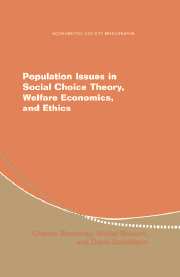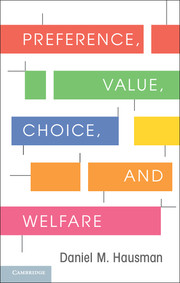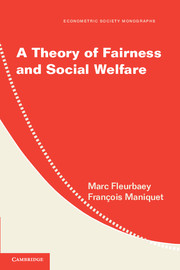Population Issues in Social Choice Theory, Welfare Economics, and Ethics
$140.00 (C)
Part of Econometric Society Monographs
- Authors:
- Charles Blackorby, University of Warwick
- Walter Bossert, Université de Montréal
- David J. Donaldson, University of British Columbia, Vancouver
- Date Published: August 2005
- availability: Available
- format: Hardback
- isbn: 9780521825511
$
140.00
(C)
Hardback
Other available formats:
Paperback
Looking for an examination copy?
If you are interested in the title for your course we can consider offering an examination copy. To register your interest please contact [email protected] providing details of the course you are teaching.
-
This book presents an exploration of the idea of the common or social good, extended so that alternatives with different populations can be ranked. Basing rankings on the well-being, broadly conceived, of those who are alive (or ever lived), the axiomatic method is employed. Topics investigated include the measurement of individual well-being, social attitudes toward inequality of well-being, the main classes of population principles, principles that provide incomplete rankings or rank uncertain alternatives, best choices from feasible sets, and applications.
Read more- Authors internationally known for their work on the subject matter, including analytical basis for evaluating policy decisions
- Multidisciplinary focus embraces economics, ethics, and public policy in particular
- Chapters divided into nontechnical and technical sections, making overall argument accessible to a broad audience
Customer reviews
Not yet reviewed
Be the first to review
Review was not posted due to profanity
×Product details
- Date Published: August 2005
- format: Hardback
- isbn: 9780521825511
- length: 378 pages
- dimensions: 229 x 152 x 22 mm
- weight: 0.67kg
- contains: 20 b/w illus. 32 tables
- availability: Available
Table of Contents
1. Introduction
2. The measurement of individual well-being
3. Welfarist social evaluation
4. Fixed-population principles
5. Population principles
6. Characterizations and possibilities
7. Uncertainty and incommensurabilities
8. Independence and the existence of the dead
9. Temporal consistency
10. Choice problems and rationalizability
11. Applications.
Sorry, this resource is locked
Please register or sign in to request access. If you are having problems accessing these resources please email [email protected]
Register Sign in» Proceed
You are now leaving the Cambridge University Press website. Your eBook purchase and download will be completed by our partner www.ebooks.com. Please see the permission section of the www.ebooks.com catalogue page for details of the print & copy limits on our eBooks.
Continue ×Are you sure you want to delete your account?
This cannot be undone.
Thank you for your feedback which will help us improve our service.
If you requested a response, we will make sure to get back to you shortly.
×






